Present Simple Tense
Итак, пришло время поговорить о временах группы Simple. В ней нет ярко проявленного «интереса», поэтому иногда ее называют Indefinite – неопределенная («интерес» не определен). Об этой группе мы вспоминаем, когда говорим о том, что такое инфинитив глагола. Инфинитив глагола является инфинитивом (формулой) группы Simple. В ней просто констатируются факты. Это группа информационная: мы сообщаем либо о постоянном действии в настоящем, либо о факте совершения действия в прошлом или будущем.
Тем не менее, Present Simple Tense – это одно из самых простых и важных времен, которое мы используем каждый день, чтобы описывать повседневные действия, привычки, факты и расписания. Давайте разберемся вместе, что это такое, когда его используют и как правильно строить предложения.
Present Simple Tense (настоящее простое время) – это время, которое мы используем, чтобы говорить о том, что происходит регулярно, постоянно или часто. Оно показывает действия, которые происходят в настоящем времени, но не обязательно прямо сейчас. Например, когда мы говорим “I read a book every evening” (Я читаю книгу каждый вечер), это означает, что я делаю это регулярно, каждый вечер, но не в настоящий момент. Или “My friends usually play football on Saturdays” (Мои друзья обычно играют в футбол по субботам), здесь мы описываем привычные действия, которые происходят с друзьями по выходным.
Present Simple Tense также используется для описания фактов, правил, общепринятых истин. Например, “The sun rises in the east” (Солнце восходит на востоке) или “The water boils at 100 degrees Celsius” (Вода кипит при 100 градусах Цельсия) – здесь мы говорим о всемирно признанных фактах, которые верны всегда. Мы также используем это время для выражения расписания (The train leaves at 8:00), регулярных событий, научных истин (The Earth is round), а также когда мы описываем человека, его привычки и характеристики (Mary works in a school. She is a teacher).
А теперь давайте посмотрим, как правильно строить предложения в Present Simple Tense. Для этого нужно помнить основные правила:
В утвердительных предложениях для третьего лица единственного числа (he, she, it) добавляется окончание -s к смысловому глаголу. Например: I play (Я играю). He plays (Он играет).
Если инфинитив оканчивается на e, y (перед которой стоит гласная) или согласную, кроме шипящих, s и x, то добавляем только –s: like — likes, ride — rides, play — plays, say — says, swim — swims, clap — claps.
Если инфинитив оканчивается на шипящую (sh, ch), o, s, ss или x, то добавляем –es: watch — watches, finish — finishes, do — does, go — goes, kiss — kisses, miss — misses, fix — fixes, mix — mixes.
Если инфинитив оканчивается на y, перед которой стоит согласная, то необходимо y поменять на i. Тогда получится на конце слова –ies: fly — flies, cry — cries. Если инфинитив оканчивается на y, перед которой стоит гласная, то просто добавляется окончание –s.

подл. + V-s /-es (he, she, it)

В отрицательных предложениях к вспомогательному глаголу Do/Does добавляем отрицательную частицу not (сокращенные формы don’t, doesn’t), а смысловой глагол возвращается в форму инфинитива. Например: I do not play tennis (Она не играет в теннис). She does not dance (Она не танцует). Do используется для местоимений I, we, you, they, does – для he, she, it.
подл. + do not/does not + V
В вопросительных предложениях мы меняем порядок слов и перемещаем вспомогательный глагол do/does на первое место. Например: Do you like ice cream? – Yes, I do (Тебе нравится мороженое? – Да).

Do / Does + подл. + V
 Прочтите данные ниже слова, используя их, составьте небольшой рассказ о себе в соответствующем времени.
Прочтите данные ниже слова, используя их, составьте небольшой рассказ о себе в соответствующем времени.
• wake up • brush teeth • eat breakfast • go to school • come home • play • sleep
______________________________________________________________________________________________________________________________________________________________________________________________________________________________________________________________________________________________________________________________________________________________________________
Слова-маркеры (наречия времени) для времени Present Simple Tense: usually (обычно), always (всегда), every day, week, month, year (каждый день, неделю, месяц, год), often (часто), sometimes (иногда), seldom (редко), rarely (редко), never (никогда).
Наречия времени ставятся:
перед основным глаголом: She usually read a book at 7 o’clock.
после вспомогательного глагола to be: He is always late.
наречия времени, состоящие из 2-х и более слов, ставятся в начале или в конце предложения: They play tennis every day. In the morning I brush my teeth.
Помните, что Present Simple Tense – это основа для многих других времен и форм в английском языке. Он является ключом к правильной коммуникации и пониманию друг друга.
УПРАЖНЕНИЯ
Задание 1. Прочтите предложения в Present Simple, переведите и прокомментируйте, к какому случаю употребления относится каждое из них.
научный факт;
расписание;
привычка;
характеристика человека;
регулярное действие.
1. I play tennis every Saturday. 2. She reads books every evening. 3. He likes to watch movies on weekends. 4. They go to the park on Sundays. 5. We eat breakfast at 7 am. 6. My mom cooks dinner every day. 7. The sun rises in the east. 8. Cats sleep a lot during the day. 9. Birds sing in the morning. 10. He works in an office. 11. She speaks Spanish fluently. 12. We love to travel. 13. The Earth rotates around the sun. 14. People need to eat healthy food. 15. I study English every day.
Задание 2. Поставьте глаголы в правильную форму, раскрыв скобки.
А) 1. Kate (to drink) tea every morning. 2. We (to play) football every day. 3. He (to be) a pupil. 4. My sister (to get up) at 7 o’clock. 5. They (to leave) home at 8.30 every morning. 6. My mother (to be) busy on Sunday. 7. We (to arrive) home late. 8. The children always (to do) homework. 9. They (to read) the newspapers every evening. 10. We often (to drink) tea together.
В) 1. Alice (to have) a sister. 2. Her sister’s name (to be) Ann. 3. Ann (to be) a student. 4. She (to get) up at seven o'clock. 5. She (to go) to the institute in the morning. 6. Jane (to be) fond of sports. 7. She (to do) her morning exercises every day. 8. For breakfast she (to have) two eggs, a sandwich and a cup of tea. 9. After breakfast she (to go) to the institute. 10. Sometimes she (to take) a bus.
С) 1. My working day (to begin) at six o'clock. 2. I (to get) up, (to switch) on the TV and (to brush) my teeth. 3. It (to take) me about twenty minutes. 4. I (to have) breakfast at seven o’clock. 5. I (to leave) home at half past seven. 6. I (to take) a bus to the institute. 7. It usually (to take) me about fifteen minutes to get there. 8. Classes (to begin) at eight. 9. We usually (to have) four classes a day. 10. I (to have) lunch at about 2 o’clock.
Задание 3. Переделайте следующие предложения из утвердительных в отрицательные.
1. I run very fast. 2. He runs very fast too. 3. We often sleep in the garden. 4. Her sister leaves home early. 5. Sally opens the window in her room when it is hot. 6. Mr. Bay often goes to the cinema with his son. 7. My Mammy swims very well. 8. We swim well too. 9. She always makes a lot of mistakes. 10. The Olympic Games take place every 5 years.
Задание 4. Переделайте следующие предложения из утвердительных в вопросительные, составьте ответы.
1. My sister gets up at eight o'clock. 2. We go to school in the afternoon. 3. Jane is fond of sports. 4. She does her morning exercises every day. 5. They have two eggs, a sandwich and a cup of tea for breakfast. 6. It takes him two hours to do his homework. 7. My friends speak French well. 8. My working day begins at seven o'clock. 9. My father and I leave home at eight o'clock. 10. He takes a bus to his office.
Задание 5. Раскройте скобки, употребляя глаголы в Present Simple.
1. I (to run) ………… very fast. 2. He (to run) ............ very fast too. 3. We often (to sleep) ............ in the garden. 4. Her sister (to leave) ……... home early. 5. Sally (to open) ............... the window in her room when she is hot. 6 Mr. Bay often (to go) ............. to the cinema with his son. 7. My Mammy (to swim) ............... very well. 8. We (to swim) .............. well too.
Задание 6. Вставьте do или does.
1. The Dillons …n’t live at 45 Green Street. 2. … she come home late? 3. We … n’t do homework every evening. 4. …. they get up early? 4. … my brother visit our grandmother every Sunday? 5. He …n’t know these rules. 6. My parents …n’t work at this plant. 7. The girl …n’t play the piano. 8. Our friends … n’t like reading. 9. These boys … n’t play football.
Задание 7. Используйте слова в скобках для образования предложений в Present Simple. Обратите внимание, в какой форме должно стоять предложение (утвердительной, вопросительной или отрицательной).
1) They ________ football at the institute. (to play)
2) She ___________ emails. (not / to write)
3) ____ you_______ English? (to speak)
4) My mother _______ fish. (not / to like)
5) ____ Ann _______ any friends? (to have)
6) His brother ________ in an office. (to work)
7) She __________ very fast. (cannot / to read)
8) ____ they _______ the flowers every 3 days? (to water)
9) His wife ________ a motorbike. (not / to ride)
10) ____ Elizabeth_________ coffee? (to drink)
З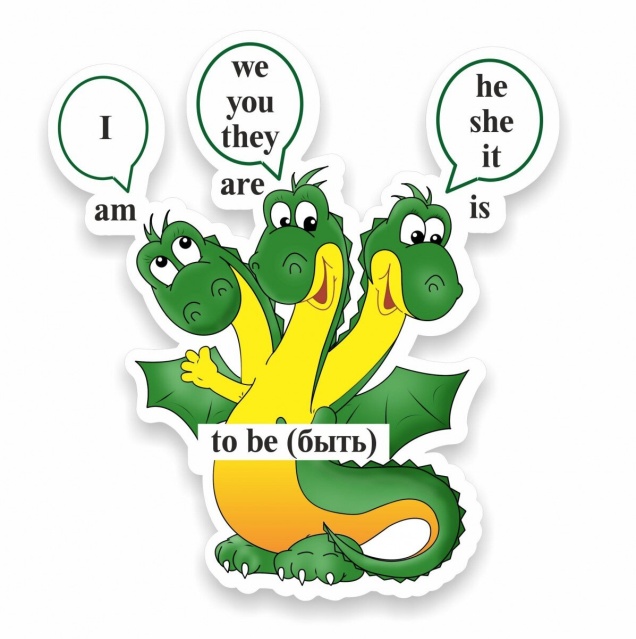 адание 8. Вставьте глагол “to be” в требуемой форме Present Simple.
адание 8. Вставьте глагол “to be” в требуемой форме Present Simple.
1. She _______ a teacher. 2. They _______ from Spain. 3. He _______ a good swimmer. 4. We _______ happy to see you. 5. The train _______ late again. 6. It _______ a beautiful day outside. 7. I _______ not feeling well today. 8. She _______ always on time. 9. They _______ excited for their vacation. 10. The cat _______ sleeping on the couch. 11. He _______ a talented musician. 12. We _______ going to the park later. 13. It _______ important to be kind. 14. She _______ very good at math. 15. The books _______ on the shelf.
Задание 9. Переведите предложения на английский язык. Нарисуйте картинку к одному из предложений.
1. Я люблю играть со своими игрушками. 2. Он каждое утро завтракает. 3. Она ездит в школу на автобусе. 4. Они катаются на велосипедах каждый вечер. 5. Мы читаем по вечерам. 6. Моя кошка любит молоко. 7. В небе сияет солнце. 8. Птицы не умеют разговаривать. 9. Собака каждый день играет с мячиком. 10. Мой друг всегда помогает мне с домашним заданием.
Задание 10. Опишите ежедневную рутину Майка, дополнив пропуски правильной формой Present Simple. Раскрасьте картинки.
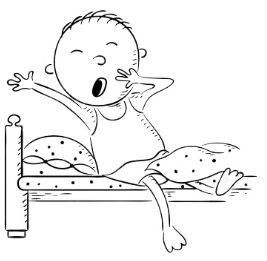
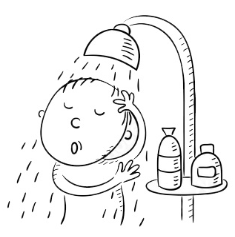
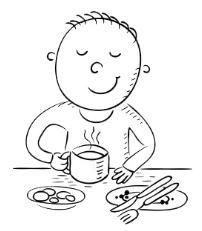
Mike (get up) at 7 o’clock Mike (take) a shower Mike (have) a breakfast
every day. every morning. at 7:30.

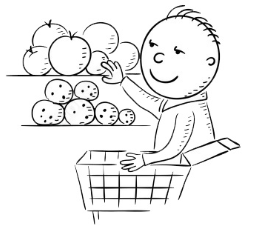
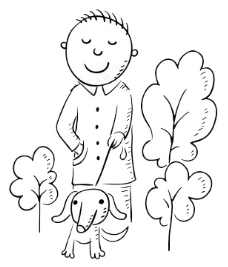
Mike (work) from 8 Mike (go) to the shop Mike (walk) the dog
till 12 every Monday. after work. at 5 o’clock every day.
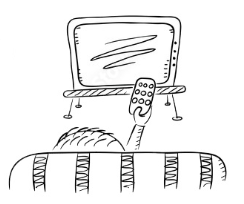
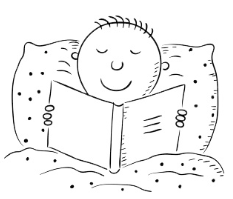
Mike (watch TV) Mike (go) to bed at
every evening. 9 pm.
 READING
READING
Прочитайте текст, подчеркните все глаголы изученного времени, переведите текст. Придумайте к нему заголовок.
_______________________
Max is a friendly golden retriever who lives with the Miller family in a cosy house with a big backyard. Every morning, Max wakes up early and greets the family with a happy bark and a wagging tail. He loves to go for walks in the park, where he sniffs every flower and tree. Max enjoys playing fetch with his favourite red ball, which he chases with great enthusiasm. He often runs around in circles, his tongue lolling out in a wide grin. After a long walk, Max is ready for a big breakfast, usually a bowl of kibble and a juicy bone. He enjoys chewing on the bone, making happy crunching sounds.
A fter breakfast, Max loves to nap in the sun on the warm grass in the backyard. He often stretches out his paws and yawns deeply, enjoying the peace and quiet. Sometimes he chases squirrels up the trees in the backyard, barking loudly and jumping excitedly. But he never catches them. Max is a gentle dog and never wants to hurt anyone.
fter breakfast, Max loves to nap in the sun on the warm grass in the backyard. He often stretches out his paws and yawns deeply, enjoying the peace and quiet. Sometimes he chases squirrels up the trees in the backyard, barking loudly and jumping excitedly. But he never catches them. Max is a gentle dog and never wants to hurt anyone.
In the afternoon, Max joins the Miller family for their afternoon tea. He loves to sit at their feet, watching them eat cookies and drink tea. He patiently waits for a few crumbs to fall on the floor, which he happily gobbles up. He enjoys the company of his family and loves to be around them.
In the evening, Max enjoys playing with his favourite toy, a squeaky rubber duck. He carries it around in his mouth and often barks at it playfully. He loves to cuddle on the couch with the Miller family, enjoying the warmth and comfort of their company. Max is a loyal and loving dog who brings joy to everyone around him.
Ответьте на вопросы по тексту:
What kind of dog is Max?
Where does Max live?
What does Max do every morning?
What does Max love to do in the park?
What is Max's favourite toy?
What does Max eat for breakfast?
Where does Max nap in the afternoon?
What does Max do in the afternoon with the Miller family?
What is Max's other favourite toy?
What kind of dog is Max?
W RITING
RITING
Составьте рассказ о ваших повседневных действиях и привычках (используя Present Simple).
______________________________________________________________________________________________________________________________________________________________________________________________________________________________________________________________________________________________________________________________________________________________________________
 LISTENING
LISTENING
Посмотрите видео и устно ответьте на вопросы ниже:
1. What time does Habla wake up?
2. What does she do first in the morning?
3. What does she do after?
4. What does she usually have for breakfast?
5. What does she do at 9 o’clock ?
6. What time does she start working?
7. Where does she usually go for lunch?
8. What time does Habla go to university?
9. What does she do after classes?
TEST YOURSELF
Пройдите тест, чтобы закрепить изученный материал. Выберите верный вариант ответа и обведите его.
1. The students ________ to school on Saturdays.
a) don’t goes b) don’t go c) don’t going
2. They _______ English lessons every Monday.
a) has b) have c) having
3. I ________ coffee in the morning.
a) drinks b) is drinking c) drink
4. He ________ football every weekend.
a) play b) plays c) playing
5. The sun__________ in the east.
a) rises b) rising c) rise
6. Mark _______ coffee in the morning.
a) doesn’t drinks b) doesn’t drink c) drank
7. ________ you play the guitar?
a) Does b) Do c) Did
8. ________ they watch TV every evening?
a) Is b) Are c) Do
9. Jane _________ to school by bus.
a) goes b) going c) go
10. ________ she go to the movies on Fridays?
a) Is b) Are c) Does
Mark: _____ / 10








 Прочтите данные ниже слова, используя их, составьте небольшой рассказ о себе в соответствующем времени.
Прочтите данные ниже слова, используя их, составьте небольшой рассказ о себе в соответствующем времени. адание 8. Вставьте глагол “to be” в требуемой форме Present Simple.
адание 8. Вставьте глагол “to be” в требуемой форме Present Simple.







 READING
READING fter breakfast, Max loves to nap in the sun on the warm grass in the backyard. He often stretches out his paws and yawns deeply, enjoying the peace and quiet. Sometimes he chases squirrels up the trees in the backyard, barking loudly and jumping excitedly. But he never catches them. Max is a gentle dog and never wants to hurt anyone.
fter breakfast, Max loves to nap in the sun on the warm grass in the backyard. He often stretches out his paws and yawns deeply, enjoying the peace and quiet. Sometimes he chases squirrels up the trees in the backyard, barking loudly and jumping excitedly. But he never catches them. Max is a gentle dog and never wants to hurt anyone.  RITING
RITING LISTENING
LISTENING









